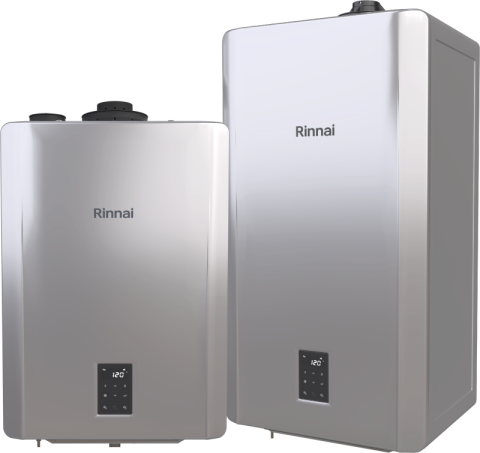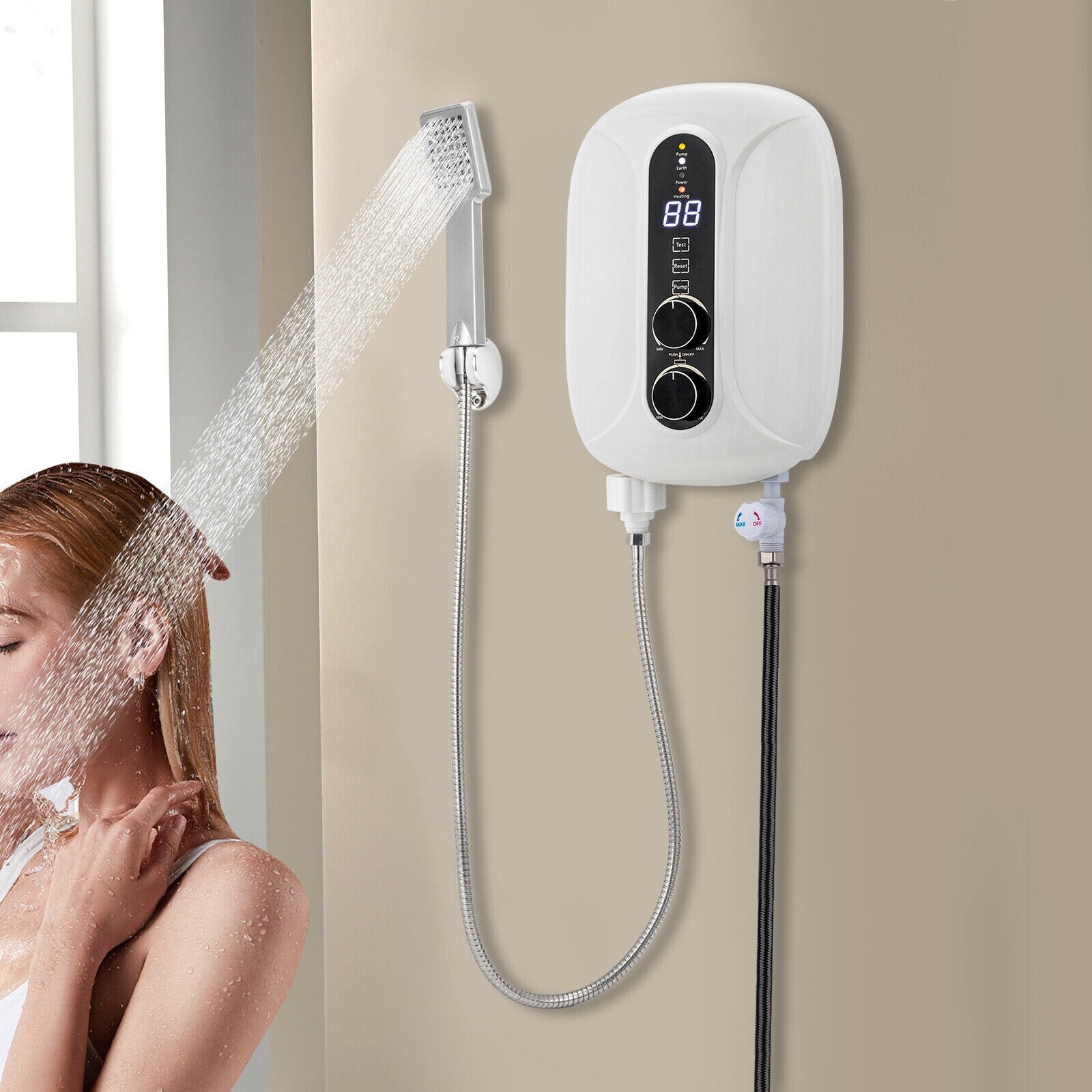We've stumbled upon this article involving 5 Benefits of Tankless Water Heaters listed below on the internet and believe it made good sense to discuss it with you on this site.

In a world where benefit and performance preponderate, it's no surprise that house owners are frequently on the lookout for smarter methods to handle their home's power consumption and comfort. One innovation that has actually continuously gained popularity is the tankless water heater. But what exactly makes these systems stick out from the traditional tank-based models most of us matured with? Let's dive in and explore the benefits of tankless water heaters, aiding you make a decision if it's time to make the switch in your house.
Introduction
Photo this: you enter the shower after a long day, anticipating a calming waterfall of hot water, only to be greeted by icy beads due to the fact that the last individual used it all up. Noise acquainted? Conventional water heaters keep a set amount of warm water, meaning you go to the grace of that storage tank's supply. Tankless systems, on the other hand, heat water as needed. Say goodbye to going out mid-shower, say goodbye to fumbling with routines simply to make sure warm water is readily available.
Recognizing Tankless Hot Water Heater
What Are Tankless Hot Water Heater?
Tankless hot water heater, in some cases referred to as on-demand or immediate water heaters, provide hot water just as it's required. As opposed to saving gallons of pre-heated water, these systems kick into activity the minute you switch on the tap. Water passes through a warmth exchanger, warming up in real-time, implying you get a nonstop circulation of warm water without the requirement for a big storage tank sitting idly by.
How Do They Differ from Traditional Equipments?
Typical heating systems hold a tank of hot water, making use of power to keep that tank at a consistent temperature. Tankless systems get rid of the standing supply, minimizing wasted energy and the bulky impact of a big cylinder. Basically, you're updating from a "accumulation" attitude to a "made-to-order" approach.
Common Kinds Of Tankless Devices
Tankless hot water heater generally are available in 2 ranges: gas and electrical. Gas designs have a tendency to provide higher flow rates, ideal for larger households, while electrical versions usually offer smaller sized homes and are normally much easier to mount. Additionally, some systems are developed for point-of-use (offering one component) while others can take care of the entire home's hot water requirements.
Trick Benefits of Tankless Water Heaters
Energy Efficiency and Cost Cost Savings
No more heating up a titan container's worth of water and keeping it toasty throughout the day. Tankless heaters lower standby power losses, which can lower energy costs. While the initial expense could be greater, the lasting savings commonly warrant the investment.
3. Space-Saving Design
If your home is short on storage, getting rid of the bulky tank frees up important area. Tankless systems are portable and can usually be placed on wall surfaces, concealed in edges, or set up in tight energy storage rooms without monopolizing the entire area.
4. Longer Lifespan
A well-maintained tankless hot water heater can outlive its tank-based cousin. Conventional containers might last 10-15 years, while tankless versions can keep chugging along for 20 years or even more, making them a strong financial investment with time.
1. Endless Warm Water Supply
Ever needed to arrange showers so everyone gets their fair share of warm water? With tankless, that comes to be a thing of the past. As long as the heater's circulation capability isn't exceeded, you can take back-to-back showers without becoming a popsicle.
5. Improved Water Top Quality
Keeping water in a container can sometimes cause debris build-up or a slightly "off" preference. With tankless systems, fresh water is warmed on the spot, decreasing the possibilities of sediment build-up and potentially supplying cleaner-tasting water.
Factors to consider Prior To Changing
Though the benefits are compelling, it's a good idea to take into consideration a couple of variables before fully dedicating.
Evaluating Your Home's Water Use Patterns
If your house at the same time uses numerous fixtures with high warm water demand, ensure the unit's circulation rate fulfills your demands. Recognizing your usage patterns aids you choose the right dimension and type of tankless heater.
Upkeep and Treatment Tips
Tankless systems are relatively low maintenance, however they aren't set-it-and-forget-it home appliances.
Regular Cleaning and Descaling
Hard water minerals can build up in the heat exchanger, impacting effectiveness. Regular descaling (typically advised each year) maintains the device going for peak performance.
Yearly Professional Assessments
A yearly checkup from an expert makes sure small problems are caught early. They'll evaluate the system's performance, search for leaks, and help keep optimum effectiveness.
Preliminary Investment Costs
Tankless heaters typically feature a greater upfront price tag. In between the unit itself and potential setup alterations, the preliminary cost may give you sticker label shock. Yet remember to watch it as a long-term investment.
Installation Needs
Relying on your home's facilities, you could need added electrical ability or gas line upgrades. Ensure you comprehend the installment demands and consult with an expert to stay clear of surprises.
Guaranteeing Appropriate Air Flow
For gas models, proper ventilation is important to securely eliminate exhaust gases. Make sure venting systems are clean and correctly set up to avoid any kind of potential security dangers.
Contrasting Different Brands and Designs
Not all tankless water heaters are produced equal.
Researching Reputable Makers
Try to find trustworthy brand names with a history of producing high quality units. A reliable manufacturer frequently offers far better consumer support and longer warranties.
Setup: Do It Yourself or Professional?
While some house owners relish dealing with tasks themselves, tankless installation could not be the very best time to break out the tool kit.
Benefits and drawbacks of DIY Installment
A DIY install can conserve cash, however it comes with dangers. Incorrect setup can lead to ineffectiveness or safety problems. If you're handy and have experience, it may be viable-- but wage care.
Reviewing Evaluations and User Feedback
Individual testimonials and feedback from next-door neighbors or good friends that have actually gone tankless can use beneficial understandings. Sometimes, real-life experiences can be more informing than marketing sales brochures.
When to Call a Professional Plumbing Professional
For the majority of, calling a professional ensures every little thing's done properly. A specialist plumbing technician understands local codes, sizing demands, and venting parameters, lowering the threat of mishaps.
Making best use of Performance
You have actually bought a tankless system-- now maximize its effectiveness.
Optimal Temperature Settings
Many people establish their systems between 120-140 F. Readjusting the temperature can boost convenience and cost savings. Experiment to locate a pleasant place that doesn't squander power.
Pairing with Low-Flow Fixtures
Want to stretch your device's capacities? Take into consideration installing low-flow showerheads and faucets. They lower water use, allowing your tankless system to provide a consistent stream of hot water without stressing.
Ecological Impact
Tankless hot water heater line up with greener living objectives.
Reduced Carbon Impact
By utilizing much less power and only heating water as required, tankless systems can decrease your home's carbon impact, reducing your ecological impact.
Conserving Natural Resources
Less energy consumption and much less wasted hot water convert right into fewer natural resources being used, an environmental win-win.
Who Profits A Lot Of from Tankless Heaters?
The elegance of tankless heating units is that they can fit a variety of families.
Huge Households vs. Single Residents
Large family members may like the endless hot water supply, while single passengers value the energy cost savings from not heating an entire container for simply one person's early morning shower.
Home Owners with Minimal Room
If your home is short on square footage, shedding the bulky container frees up room for various other essentials-- or perhaps just much more elbow room.
Eco-Conscious Consumers
Going tankless aligns with environmentally friendly worths, ensuring you're not losing power or sources.
Future Fads in Tankless Water Heaters
The globe of home devices is ever-evolving, and tankless water heaters are no exception.
Improvements in Innovation
R&D is frequently improving heat exchangers, making systems extra efficient and durable. Future versions could be also quieter, a lot more small, and much better matched for differing environments.
Smart Home Assimilation
Envision readjusting your hot water heater's temperature through an app or getting maintenance alerts on your phone. As clever home technology breakthroughs, we'll see even more connection and benefit.
Conclusion
Picking a tankless water heater is more than just updating your home's warm water system; it's purchasing long-lasting convenience, power effectiveness, and a greener lifestyle. By considering your house's water use, bearing in mind installation demands, and dedicating to normal maintenance, you can appreciate a constant stream of hot water without the luggage of a bulky tank. As innovation advances, you can eagerly anticipate also smarter, more effective tankless remedies that not just make your life simpler however additionally benefit the earth.
Pros and Cons of Tankless Water Heaters
Tankless Water Heater Pros
- Saves Energy: Simply put, you re spending less energy to create hot water, so your total carbon footprint goes down, not to mention your bills.
- Lasts Longer Than Storage Tanks: Storage tank units need to be replaced every 15 years or so. But tankless units? They can last for 30 years before they give out on you.
- Constant Hot Water: Need to take a shower and don t want the water running cold? Awesome it won t. The water will stay hot the entire time because it creates hot water on demand.
- Saves You Money: Less water usage equals less money. Beyond that, you re not paying to keep water hot 24/7. Those savings add up quickly.
- Better for the Environment: Less water waste is better for everyone. It saves you money, but it s also environmentally conscious at the same time.
Tankless Water Heater Cons
- It Can Take a Minute: Depending on your specific unit and its placement, it can take anywhere from 10 seconds to 2 minutes to fully heat up. Because there s no storage tank, it heats water as you need it.
- Upfront Purchase Price: While we talked about their longevity, there s sticker shock when you look at brand-new tankless units to install. It pays for itself, but it s still a big chunk of change at first.
- Has its Limits: If you run multiple appliances at once, such as the dishwasher, washing machine, and maybe you take a shower at the same time, there might not be enough hot water.
https://www.airsouthnow.com/blog/water-heater-service/pros-and-cons-of-tankless-water-heaters/

Hopefully you liked our post about Pros and Cons of Tankless Water Heater. Thanks so much for taking time to browse our content. Please pause to promote this blog if you appreciated it. We treasure your readership.
Call Today
Comments on “Top Motives Why Tankless Water Heaters Become Beneficial”